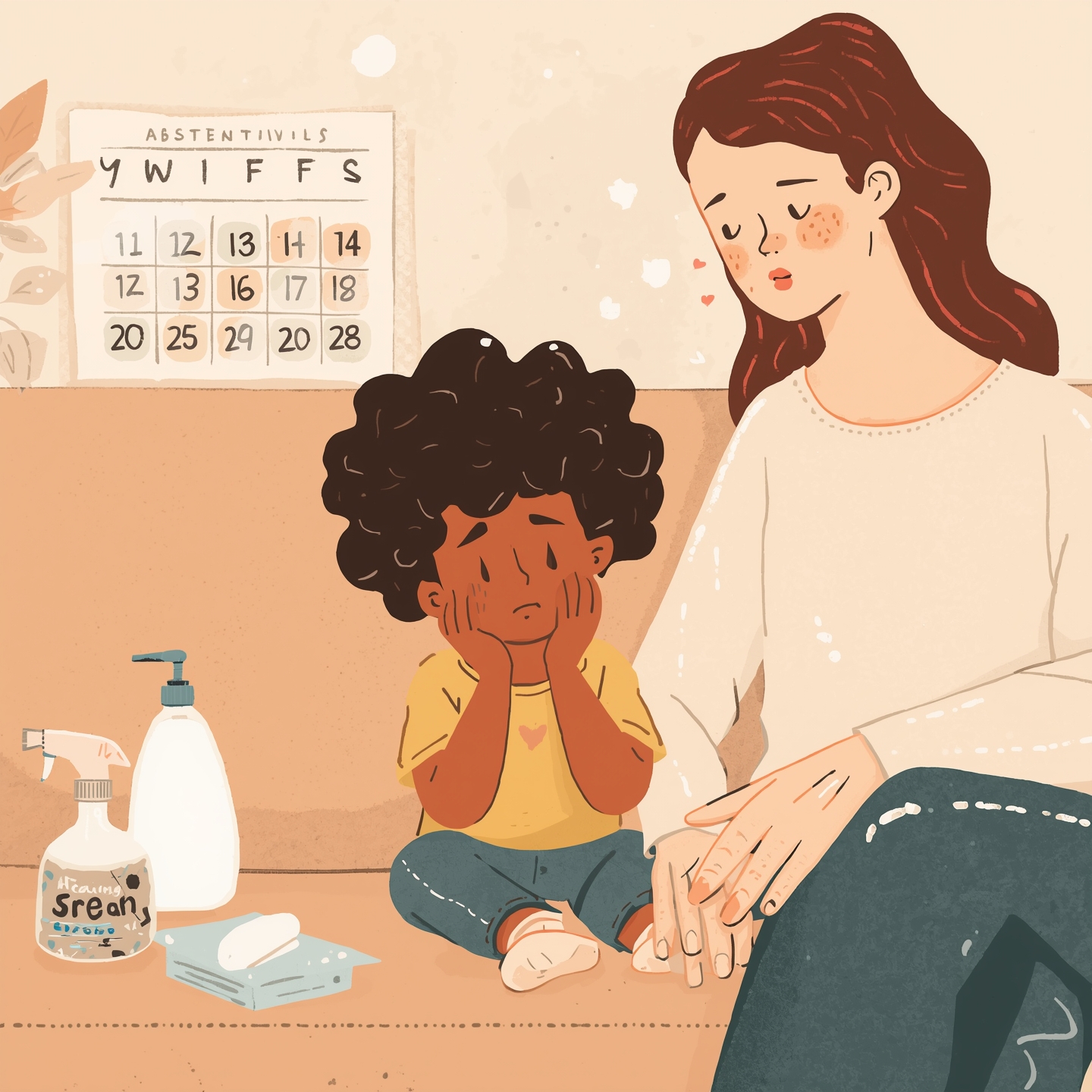Health OCD in children is characterised by an overwhelming fear of having serious illnesses despite clear medical evidence of good health. Unlike ordinary worries about sickness, this condition involves intrusive, recurrent thoughts that trigger compulsive behaviours (body-checking, repeated questioning, constant reassurance-seeking) and significantly interfere with play, learning, and social life.
What is Health OCD in Children?
Health OCD in children occurs when anxiety about health becomes persistent and intrusive, causing the child to misinterpret normal bodily sensations (a headache, stomachache, cough) as signs of severe disease. Key features include obsessive thoughts about illness, compulsions to check or seek reassurance, and marked distress or impairment in daily functioning.
How It Differs From Typical Childhood Health Worries
Many children worry about illness at times, but Health OCD is different because the worries are:
- Persistent and intrusive rather than temporary.
- Disproportionate to actual medical evidence.
- Linked to compulsive behaviours that provide only short-term relief.
- Interfering with school, play, and relationships.
Symptoms of Health OCD in Children
Physical (anxiety-driven) symptoms
- Racing heart, shortness of breath, dizziness, sweating, muscle tension.
- Somatic sensations triggered by anxiety which then reinforce fear.
Psychological and behavioural symptoms
- Persistent intrusive thoughts about having serious illnesses.
- Frequent body-checking (mirrors, lumps, bruises).
- Excessive asking for reassurance from parents, teachers, or doctors.
- Avoidance of activities perceived as risky (sports, play, school trips).
- Compulsive researching of symptoms or excessive internet searching.
- Social withdrawal, sleep disruption, decreased concentration at school.
Types / Common Presentations
- Contamination-focused: fixation on germs and illness from contact.
- Disease-specific fears: persistent fear of cancer, HIV, etc.
- Self-monitoring: continual scanning for lumps, marks, or changes.
- Information-seeking: compulsive researching or demanding explanations.
Causes & Contributing Factors
Psychological factors
Perfectionism, high sensitivity, intolerance of uncertainty, and a tendency to catastrophize increase risk.
Social / family factors
Family health anxieties, parental reassurance cycles, or modelling of checking behaviours can contribute to the child’s fears.
Environmental stressors
Exposure to illness in the family, bereavement, or heightened public health messaging (e.g., pandemics) can precipitate or worsen symptoms.
Impact on School, Social Life & Development
- Difficulty concentrating and poor academic performance due to intrusive thoughts.
- Avoidance of physical activities and social situations, reducing peer interaction.
- Lowered confidence and increased shame or frustration.
- Family strain from repeated reassurance and medical visits.
Treatment Approaches
Cognitive Behavioral Therapy (CBT)
CBT is the first-line treatment. Therapists help children identify distorted health beliefs, use thought records and behavioural experiments, and replace catastrophic interpretations with balanced thinking.
Exposure and Response Prevention (ERP)
ERP—a behavioural form of CBT—exposes the child to health-related triggers (talking about illnesses, noticing benign bodily sensations) while preventing checking or reassurance. Repeated exposures reduce anxiety naturally.
Acceptance and Commitment Therapy (ACT)
ACT teaches children to notice intrusive thoughts without acting on them and to engage in value-driven activities (friendship, learning, play) despite anxiety.
Wellness Coaching & Lifestyle
Promotes routines that stabilise mood: sleep hygiene, balanced diet, exercise, reduced screen time, and structured leisure—helping to reduce overall anxiety and internet-driven symptom-checking.
Personality Dynamics & Strength-Based Work
Therapists reframe traits like sensitivity and conscientiousness as strengths, teaching children and families how to channel these qualities productively while reducing shame.
Coping Skills for Children & Parents
- Relaxation techniques (deep breathing, progressive muscle relaxation).
- Mindfulness and grounding exercises.
- Scheduled worry time and behavioural substitutions (journalling, play).
- Parental coaching to limit reassurance and to reinforce ERP practice.
Success Story
Ms. Arpita — Age 11 (Delhi)
Arpita repeatedly checked her body and sought constant reassurance. At Emotion of Life she received CBT to challenge fearful thoughts, ERP to face triggers without checking, ACT to accept intrusions, and wellness coaching for routine and sleep. A personality-dynamics approach reframed her sensitivity as self-awareness. Over time she developed coping skills, reduced anxiety, and returned to joyful play and school activities.
FAQ
How is Health OCD different from normal childhood worries?
What physical effects can it cause?
How does it affect school and social life?
Can lifestyle changes help?
How can parents support?
Can children fully recover?
16-Step Outline — OCD Recovery & Cure Program (Children)
Below is an actionable framework you can adapt to children’s needs. Use with clinical supervision.
- Comprehensive assessment & baseline symptom mapping
- Psychoeducation for child and family
- Collaborative goal-setting (values-based)
- Develop a personalized ERP hierarchy
- Begin graded ERP exposures (parent-supported)
- Cognitive restructuring and thought records
- Introduce acceptance & defusion exercises (ACT)
- Wellness coaching (sleep, nutrition, activity)
- Parental coaching & response-consistency training
- School liaison & classroom support plan
- Behavioral experiments and real-world practice
- Strengths & personality dynamics integration
- Social skills rebuilding & graded reintegration
- Relapse prevention plan & booster scheduling
- Progress review & measurable outcomes tracking
- Maintenance & community/group support referral
Relapse Prevention & Long-Term Support
Ongoing monitoring, family support, booster ERP sessions, and maintaining wellness routines help reduce the chance of relapse. A written relapse-prevention plan with clear steps and contacts is recommended.
FAQs on Health OCD in Children | Emotion of Life How is Health OCD different from normal childhood worries?
Normal worries are short-lived and proportionate to events. Health OCD is persistent, intrusive, and causes compulsive behaviours that impair functioning despite medical reassurance. What physical effects can it cause?
Anxiety-related symptoms like racing heart, sweating, dizziness, and stomachaches are common and can reinforce the child’s belief that they are ill. How does it affect school and social life?
Children may avoid activities, struggle to concentrate, withdraw from peers, and show reduced academic engagement due to intrusive health fears. Can lifestyle changes help?
Yes—wellness coaching and routines (sleep, nutrition, exercise, reduced screen-time) reduce baseline anxiety and complement therapy. How can parents support?
Limit reassurance, model calm behaviour, encourage evidence-based therapy, support ERP practice at home, and collaborate with teachers and therapists. Can children fully recover?
Many children make excellent recovery with early intervention, consistent therapy, coping skills, and family support.



